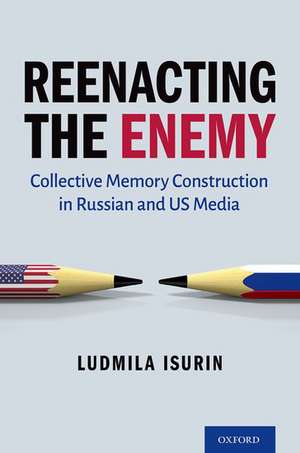Reenacting the Enemy: Collective Memory Construction in Russian and US Media
Autor Ludmila Isurinen Limba Engleză Hardback – 12 iul 2022
Preț: 329.95 lei
Preț vechi: 422.40 lei
-22% Nou
Puncte Express: 495
Preț estimativ în valută:
63.14€ • 66.09$ • 52.55£
63.14€ • 66.09$ • 52.55£
Carte disponibilă
Livrare economică 28 februarie-06 martie
Preluare comenzi: 021 569.72.76
Specificații
ISBN-13: 9780197605462
ISBN-10: 019760546X
Pagini: 328
Dimensiuni: 239 x 165 x 28 mm
Greutate: 0.58 kg
Editura: Oxford University Press
Colecția OUP USA
Locul publicării:New York, United States
ISBN-10: 019760546X
Pagini: 328
Dimensiuni: 239 x 165 x 28 mm
Greutate: 0.58 kg
Editura: Oxford University Press
Colecția OUP USA
Locul publicării:New York, United States
Recenzii
Isurin brings deep expertise on culture and media in the U.S. and Russia to show how prejudice toward the other grows out its desire to project its own attitudes and values as superior. She then goes on to demonstrate how this dynamic organizes national memory. She also argues that at least in some instances an independent, liberal media in Russia provides a surprising critical view that is less evident on the American side. Her conclusions may be uncomfortable for both American and Russian readers, but that is the point and one of the book's great contributions. This is a brilliant contribution to memory studies in general, and to advancing understanding of why relations between Russia and the U.S. remain so fraught.
In a masterful marriage between a deep understanding of Russian and American political culture and a careful reading of both countries' media, Isurin provides a unique insight into how media both shapes and reflects the collective memories of a nation. This book is a must-read for any student interested in the current antagonisms between Russia and the US, as well as for students of collective memory exploring the role of media in politics.
Overall, Reenacting the Enemy. Collective Memory Construction in Russian and US Media is a useful, thought-provoking and meticulous book...It will be of value to those interested in cognitive psychology, international relations and media studies, especially the interplay between collective memory, media and the mind.
A brief review cannot do justice to the extraordinary depth of the interdisciplinary analysis of collective memory formation from media accounts in Russia and the US given in Reenacting the Enemy: Collective Memory Construction in Russian and US Memory. In this book, Ludmila Isurin considers three processes of collective memory construction, including the deliberate or subconscious reorientation of accepted historical facts, different interpretations of the causes of past conflicts, and the understanding of who should be blamed for these conflicts.
In a masterful marriage between a deep understanding of Russian and American political culture and a careful reading of both countries' media, Isurin provides a unique insight into how media both shapes and reflects the collective memories of a nation. This book is a must-read for any student interested in the current antagonisms between Russia and the US, as well as for students of collective memory exploring the role of media in politics.
Overall, Reenacting the Enemy. Collective Memory Construction in Russian and US Media is a useful, thought-provoking and meticulous book...It will be of value to those interested in cognitive psychology, international relations and media studies, especially the interplay between collective memory, media and the mind.
A brief review cannot do justice to the extraordinary depth of the interdisciplinary analysis of collective memory formation from media accounts in Russia and the US given in Reenacting the Enemy: Collective Memory Construction in Russian and US Memory. In this book, Ludmila Isurin considers three processes of collective memory construction, including the deliberate or subconscious reorientation of accepted historical facts, different interpretations of the causes of past conflicts, and the understanding of who should be blamed for these conflicts.
Notă biografică
Ludmila Isurin is a professor at the Ohio State University. An interdisciplinary scholar whose research encompasses psycho- and sociolinguistics, social sciences and humanities with a recent focus on how collective memory is reflected in text and constructed in individual minds, she has written numerous chapters and journal articles, including an award-winning article in Language Learning. She has authored or coedited six books, including Collective Remembering.
